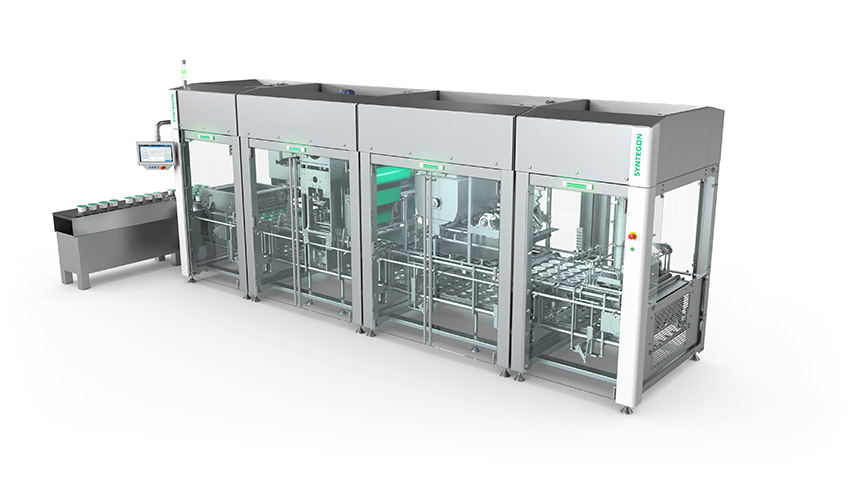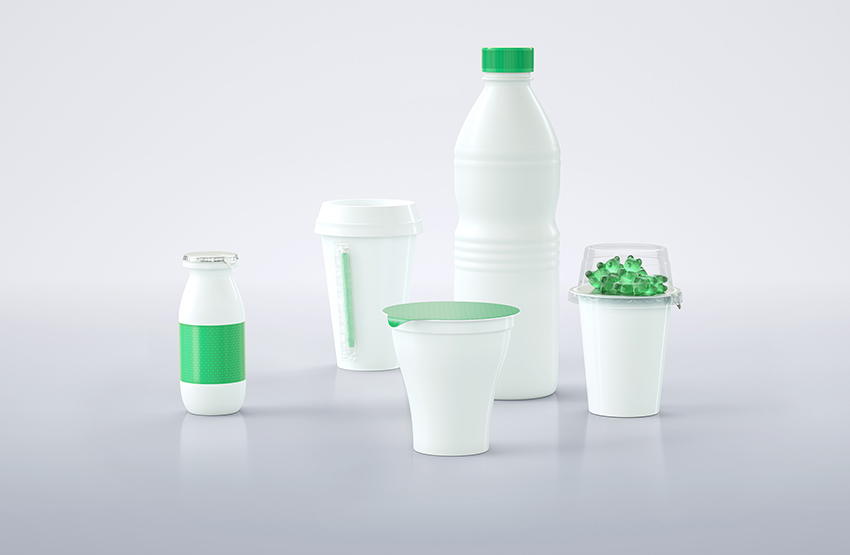Syntegon Technology is a leading global process and packaging technology provider. Formerly the packaging division of the Bosch Group, the company is headquartered in Waiblingen (Germany) and has been offering complete solutions for the pharmaceutical and food industries for over 50 years. About 6,000 employees at 30 locations in more than 15 countries generated a total revenue of 1.3 billion euros in 2020. The portfolio of intelligent and sustainable technologies includes stand-alone machines, as well as complete systems and services. Fields of application in the pharmaceutical industry are the production, processing, filling, inspection and packaging of liquid and solid pharmaceuticals (e.g. syringes and capsules). In the food industry, the portfolio includes process technology for confectionery as well as packaging solutions for dry foods (e.g. bars, bakery products and coffee), frozen foods and dairy products.
Ampack GmbH, located in Königsbrunn, Germany, was established in 1971 as a family owned business. It was acquired by Bosch Packaging Technology (now Syntegon Technology) in 2012. The company produces filling and packaging machines for the dairy and food industry, including cup and bottle filling and sealing machines as well as comprehensive after-sales service solutions.
Easy Engineering: What are the main areas of activity of the company?
AMPACK: The main areas of activity of Ampack GmbH include developing, designing and manufacturing packaging machines for liquid and viscous foods, e.g. dairy, baby food, clinical nutrition, dips, sauces, and spreads in the hygienic versions clean, ultra-clean and aseptic. Additionally, with its global service organization, the company offers fast and efficient support with comprehensive after-sales services, e.g. spare parts, retrofits and modernizations, as well as digital shopfloor solutions.
E.E: What’s the news for 2021 about new products?
AMPACK: This year, Syntegon is launching the new LFS filling and sealing machine for preformed cups. Available in clean and ultra-clean hygienic executions, it is a perfect fit for food producers who are looking for a machine that accurately and hygienically fills and seals liquid, viscous and pump required products with speeds of up to 20.000 cups/h. The application range of the LFS includes e.g. dairy and plant-based food, deli salads, dips, spreads and wet pet food. The machine’s new modular concept enables manufacturers to react quickly to changing market demands. Each machine function can be retrofitted, added or exchanged to meet customized requirements. The open design ensures optimum accessibility and visibility for easy cleaning and maintenance, resulting in a highly efficient and economical production.
E.E: What can you tell us about market trends?
AMPACK: There are two key market trends in the dairy and food industry that have an increasing impact on dairy and food packaging.
Trend 1: Food safety and anti-counterfeiting
Food safety is one of the most prevalent topics for end-consumers and producers alike. In the US, the FDA Food Safety Modernization Act (FSMA) has taken a proactive approach and changed its food safety focus from simply responding to foodborne illnesses to preventing them in the first place. The FSMA imposes specific responsibilities on food producers, including the introduction of preventive controls to address foreseeable hazards. Another key market trend directly linked to food safety is transparency, which includes clean labelling, certification by trusted third parties (3-A SSI in the US and EHEDG in the EU) as well as efficient product tracking to identify counterfeit products. Food scandals not only endanger the health of consumers, they also damage confidence in a brand or an entire industry. Modern serialization technologies make it easier for retailers and consumers to identify original products and track product routes more transparently. In some countries, such as South Korea and Russia, there is already a trend towards codes on food packaging. Serialization in the food industry is predicted to increase in the coming years, in order to actively prevent food scandals and increase safety and transparency for the end consumer.
Trend 2: Convenience and sustainability
On the one hand, consumers’ busy lifestyles give rise to single-serve portions and prepared meals. On the other, consumers demand healthy, nutritious and sustainable products. Consequently, packaging equipment needs to offer greater flexibility to package products of varying levels of viscosity as well as handle different materials in order to increase recyclability. Reconsidering conventional packaging concepts with regard to plastic and recyclability are on the rise. Some initial approaches include reusable lids or peel-off lids with integrated drinking openings as alternatives to plastic snap-on lids for refrigerated drinks. Besides reducing the plastic content and improving recyclability, the environmental impact of packaging also extends to lower carbon emissions thanks to reduced packaging weight and less product waste.
E.E: What are the most innovative products marketed?
AMPACK: A growing number of dairy and food producers have chosen advanced hygienic filling and packaging technologies to comply with food safety regulations and to address consumer concerns. These technologies are designed to prevent contamination, avoid product recalls, simplify cleaning and reduce product and material waste.
Options include ultra-clean machines that offer an extended shelf life for refrigerated products without preservatives, while aseptic machines offer shelf lives of up to a year without the need for cooling during transportation and storage. Aseptic filling technologies enable producers of sensitive products, such as baby food, to guarantee freshness and product safety without added preservatives and artificial ingredients. Machine features and hygienic technologies vary significantly from manufacturer to manufacturer. Syntegon complies with the hygienic classification standards for filling machines set by VDMA and are designed according to 3-A guidelines.
To ensure maximum product protection while switching to new packaging materials, Syntegon includes their material specialists as well as material suppliers in the process of identifying suitable technologies. After first assessment of the customer’s machine and requirements, Syntegon helps dairy producers to test, evaluate and define necessary adjustments for the transition to sustainable packaging solutions. These findings help to adapt machines that are already installed at a customer’s plant, to ensure a smooth and reliable switch to sustainable packaging.
E.E: What estimations do you have for 2021?
AMPACK: The future of the dairy industry is being shaped by regulations that boost food safety, calls for increased visibility and traceability, and consumers’ demand for convenient and healthy products. Having a knowledgeable partner who recognizes these market trends, understands the regulatory framework and offers state-of-the-art technology can help manufacturers turn these challenges into opportunities. With over 50 years of experience in hygienic filling technology from clean, ultra-clean to aseptic, Syntegon provides valuable insight into the industry. Its equipment for dairy food products was granted 3-A certification in the USA and EHEDG certification in the EU. Based on its wealth of experience and global network, Syntegon can help dairy and food producers to produce the highest quality products at the highest levels of efficiency.


